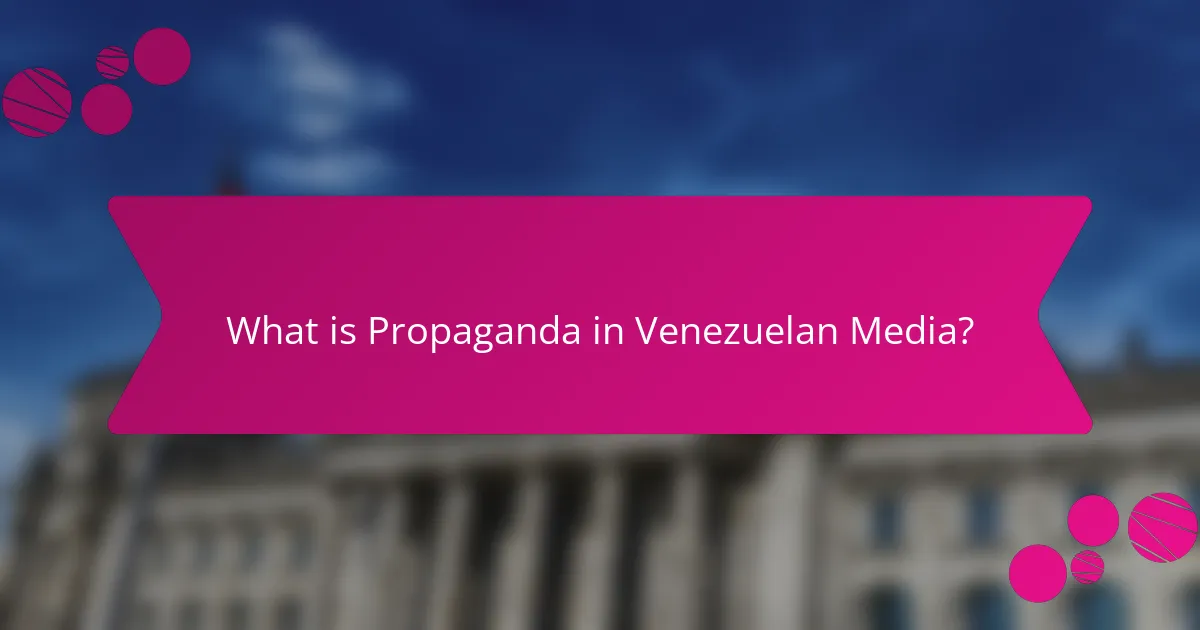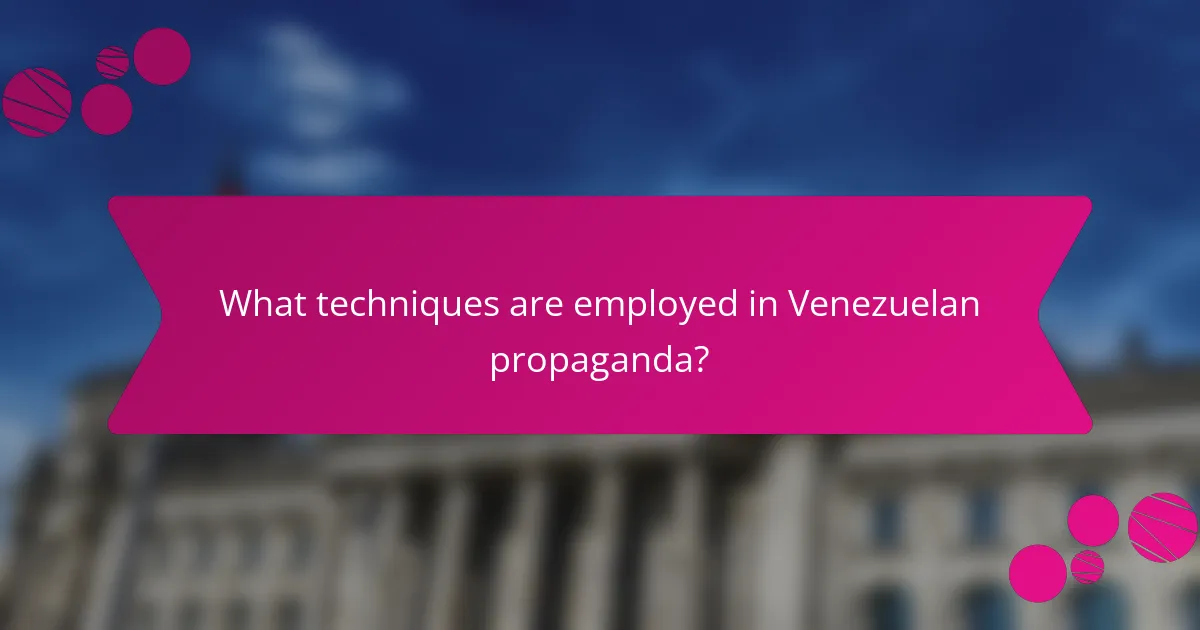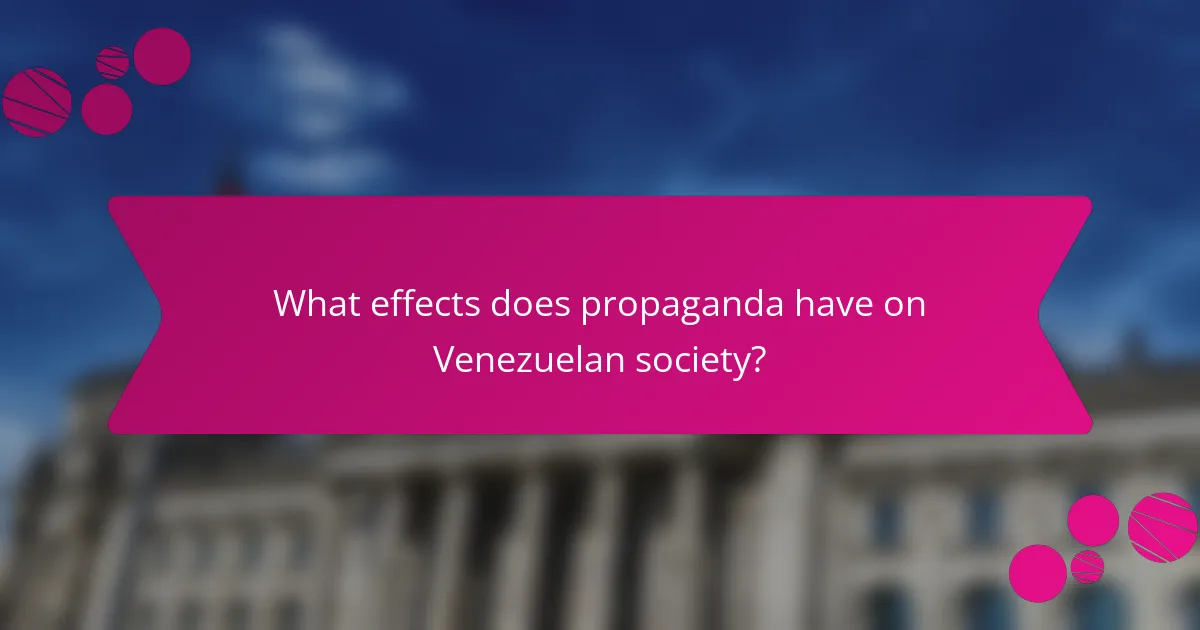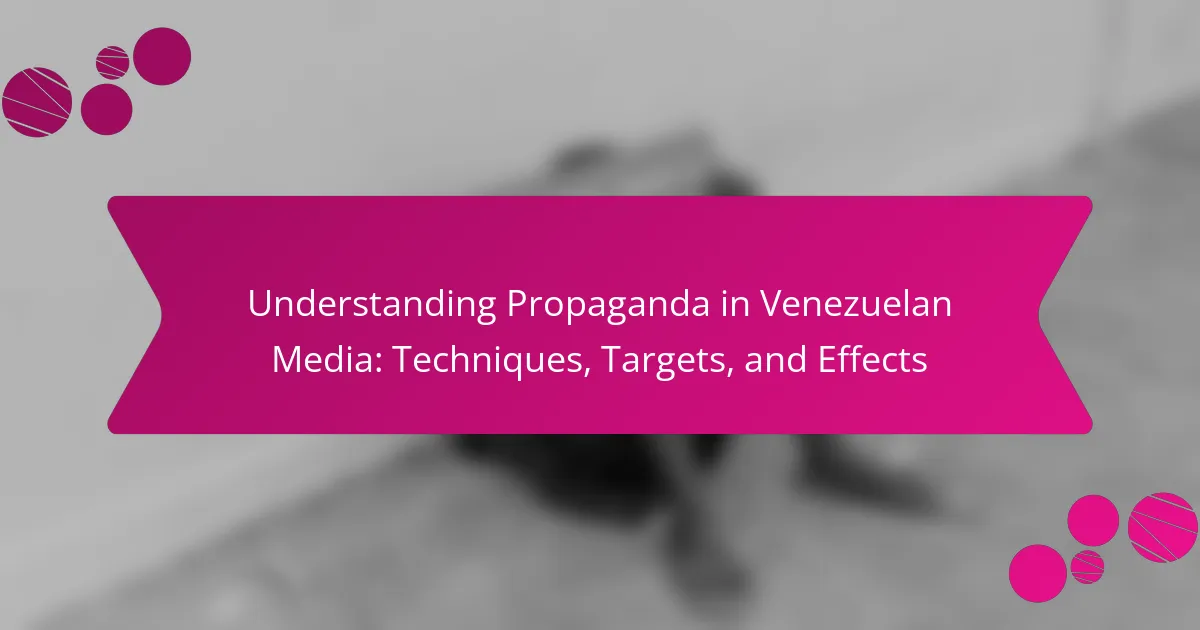
What is Propaganda in Venezuelan Media?
Propaganda in Venezuelan media refers to the dissemination of information aimed at influencing public perception and opinion in favor of the government. This form of media manipulation is often characterized by biased reporting and selective presentation of facts. The Venezuelan government has utilized state-controlled media outlets to promote its political agenda. These outlets often omit critical perspectives and emphasize positive narratives about government actions. For instance, during political crises, the government has employed propaganda to portray dissenters as enemies of the state. This strategy aims to maintain control over public discourse and suppress opposition. The effectiveness of propaganda in Venezuela is evident in the limited access to independent news sources. This control over information shapes the public’s understanding of national issues.
How is propaganda defined in the context of Venezuelan media?
Propaganda in the context of Venezuelan media is defined as the strategic dissemination of information to influence public opinion and behavior. This often involves the promotion of government narratives while suppressing dissenting viewpoints. Venezuelan state media frequently utilizes propaganda to bolster support for the ruling party. The government controls major media outlets, ensuring that coverage aligns with its political agenda. This approach has been evident during elections and crises, where media messaging is carefully crafted. Research indicates that such propaganda aims to create a favorable image of the government while discrediting opposition. Studies show that this tactic is effective in shaping perceptions among the populace.
What are the historical roots of propaganda in Venezuela?
The historical roots of propaganda in Venezuela trace back to the early 20th century. During this period, political leaders began to utilize media to influence public opinion. The rise of print media in the 1900s facilitated the spread of political messages. Governments employed newspapers to promote their agendas and suppress dissent.
In the 1950s, the dictatorship of Marcos Pérez Jiménez intensified propaganda efforts. The regime controlled media outlets to project a favorable image. This control aimed to maintain power and manipulate public perception.
Following the fall of Pérez Jiménez, propaganda continued to evolve. The establishment of television in the 1960s provided new avenues for influence. Political parties increasingly used televised messages to reach broader audiences.
In the late 20th century, Hugo Chávez further transformed propaganda in Venezuela. His government embraced state media to disseminate socialist ideals. Chávez utilized television and radio to connect directly with citizens.
These historical developments showcase how propaganda has been a tool for political control in Venezuela. The manipulation of media has shaped public opinion across different regimes.
How has the definition of propaganda evolved over time in Venezuela?
The definition of propaganda in Venezuela has evolved significantly over time. Initially, propaganda was primarily used for political messaging and national unity. During the 20th century, it became a tool for promoting government policies and ideologies. The rise of Hugo Chávez in the late 1990s marked a shift towards state-controlled media. Chávez’s government utilized propaganda to build a cult of personality and promote socialism. In recent years, the definition has expanded to include disinformation campaigns and manipulation of social media. The current regime employs propaganda to suppress dissent and control public perception. This evolution reflects changes in political power and technology in Venezuela.
What are the key characteristics of propaganda in Venezuelan media?
Propaganda in Venezuelan media is characterized by government control, biased messaging, and emotional appeals. Government control ensures that media outlets align with state narratives. This leads to a lack of diverse viewpoints and censorship of dissenting opinions. Biased messaging often portrays the government in a positive light while vilifying opposition figures. Emotional appeals are used to evoke fear or patriotism among the populace. For instance, state media frequently highlights threats from foreign nations to justify governmental actions. Additionally, propaganda often employs sensationalism to capture attention and manipulate public perception. This systematic approach shapes public opinion and reinforces the government’s agenda.
What techniques are commonly used in Venezuelan propaganda?
Venezuelan propaganda commonly employs techniques such as emotional appeal, misinformation, and state-controlled media. Emotional appeal is used to evoke strong feelings and rally public support. Misinformation often involves the dissemination of false or misleading information to shape public perception. State-controlled media ensures that the government narrative dominates news coverage. These techniques aim to reinforce government authority and suppress dissent. Historical examples include state-run television channels promoting government achievements while downplaying economic crises.
How does Venezuelan propaganda differ from other forms of media messaging?
Venezuelan propaganda differs from other forms of media messaging by emphasizing state control and ideological alignment. It often utilizes government resources to disseminate information that reinforces the regime’s narrative. This approach contrasts with independent media that may offer diverse viewpoints. Venezuelan propaganda typically targets specific demographics to maintain power and influence public opinion. The messaging often portrays the government as a champion against imperialism and capitalism, which is less common in neutral media. Furthermore, it employs emotional appeals and nationalistic themes to engage audiences. This method is designed to foster loyalty and suppress dissent. The state’s control over media outlets allows for a unified message that is not present in pluralistic media environments.
Who are the primary targets of propaganda in Venezuelan media?
The primary targets of propaganda in Venezuelan media are the general population and political opponents. The government uses media to shape public perception and control narratives. State-run media outlets disseminate messages that support government policies. These messages often aim to discredit opposition figures and movements. Additionally, propaganda targets specific demographics, such as youth and marginalized communities. This approach seeks to influence their beliefs and behaviors. Evidence shows that propaganda is used to maintain power and suppress dissent. Reports indicate that media is a crucial tool for the government in this context.
What demographic groups are most influenced by Venezuelan propaganda?
The demographic groups most influenced by Venezuelan propaganda include low-income citizens, young adults, and rural populations. Low-income citizens often rely on state-controlled media for information. This demographic is targeted through messages that promise social benefits and economic support. Young adults are influenced by propaganda that appeals to national pride and revolutionary ideals. They are often engaged through social media campaigns that resonate with their aspirations. Rural populations are targeted with propaganda that emphasizes government assistance and agricultural support programs. This group often depends on government resources for their livelihoods, making them susceptible to state messaging.
How does propaganda in Venezuelan media target political opposition?
Propaganda in Venezuelan media targets political opposition by disseminating biased narratives. State-controlled media outlets often portray opposition leaders as traitors or criminals. This portrayal aims to undermine their credibility among the public. Additionally, the government utilizes misinformation campaigns to distort opposition messages. These tactics create a hostile environment for dissenting voices. Reports indicate that this strategy has intensified during election periods. The goal is to maintain the ruling party’s power by discrediting challengers. Evidence shows that state media coverage heavily favors the government while minimizing opposition viewpoints. This systematic targeting reinforces the government’s narrative and suppresses dissent.

What techniques are employed in Venezuelan propaganda?
Venezuelan propaganda employs techniques such as emotional appeals, misinformation, and state-controlled media narratives. Emotional appeals are used to evoke feelings of nationalism and solidarity. Misinformation often targets opposition figures and foreign adversaries. State-controlled media disseminate government-approved messages to shape public perception. The government utilizes social media to reach a broader audience and engage youth. Visual imagery is also prevalent, often portraying leaders in a heroic light. These techniques aim to maintain support for the regime and discredit dissent.
How do visuals play a role in propaganda techniques?
Visuals are crucial in propaganda techniques as they enhance emotional appeal and reinforce messages. Propaganda often uses images, videos, and graphics to attract attention quickly. These visuals can evoke strong feelings, making the message more memorable. For example, in Venezuelan media, imagery of national symbols can foster a sense of pride and unity. Research shows that visuals can increase information retention by up to 65%. This effectiveness stems from the brain’s ability to process images faster than text. Therefore, visuals serve as powerful tools to shape perceptions and influence public opinion in propaganda.
What types of imagery are prevalent in Venezuelan propaganda?
Venezuelan propaganda predominantly employs imagery that emphasizes national identity and unity. Common visuals include symbols of the Venezuelan flag and national heroes. These images are often used to evoke patriotism among citizens. Additionally, the government frequently showcases visuals of social programs and community projects. This imagery aims to portray the government as a champion of the people. Furthermore, depictions of military strength and solidarity are prevalent. These visuals reinforce a narrative of protection against external threats. Propaganda also utilizes imagery of revolutionary leaders to inspire loyalty. Collectively, these types of imagery serve to shape public perception and support for the regime.
How do color schemes influence the perception of propaganda messages?
Color schemes significantly influence the perception of propaganda messages. Different colors evoke specific emotions and associations. For example, red often symbolizes urgency or danger, while blue conveys trust and calmness. These emotional triggers can shape how the audience interprets the message. Research indicates that color can affect attention and retention. A study by Satyendra Singh in the Journal of Marketing Research found that color increases brand recognition by up to 80%. Therefore, the strategic use of color in propaganda can enhance its effectiveness and impact on public perception.
What rhetorical strategies are utilized in Venezuelan propaganda?
Venezuelan propaganda utilizes several rhetorical strategies to influence public perception. These strategies include emotional appeals, repetition, and the use of authoritative language. Emotional appeals evoke feelings of nationalism and solidarity among citizens. Repetition reinforces key messages, making them more memorable and persuasive. Authoritative language establishes credibility and trust in the government’s narrative. For example, state media frequently employs these techniques to portray the government as a protector against external threats. This approach aims to unify the populace and justify government actions.
How does emotional appeal enhance the effectiveness of propaganda?
Emotional appeal enhances the effectiveness of propaganda by creating a strong connection with the audience. It taps into feelings such as fear, hope, or anger. This connection can motivate individuals to take action or adopt specific beliefs. Research shows that emotionally charged messages are more memorable and persuasive. For instance, studies indicate that fear-based appeals can increase engagement and response rates. In the context of Venezuelan media, emotional narratives often resonate deeply with the public. This resonance can lead to greater influence over public opinion and behavior.
What role does repetition play in reinforcing propaganda messages?
Repetition plays a crucial role in reinforcing propaganda messages. It enhances message retention and increases familiarity. When audiences hear the same information repeatedly, they are more likely to accept it as truth. This phenomenon is supported by the mere exposure effect, which suggests that people develop a preference for things merely because they are familiar with them. Historical examples include totalitarian regimes that used repetitive slogans to instill ideology. In Venezuelan media, the government employs repetition to solidify narratives and suppress dissent. This strategy effectively shapes public perception and influences behavior.

What effects does propaganda have on Venezuelan society?
Propaganda significantly influences Venezuelan society by shaping public perception and political opinion. It often promotes government narratives while suppressing dissenting views. The government utilizes media channels to disseminate information that aligns with its agenda. This creates a polarized environment where alternative perspectives are marginalized. Studies indicate that propaganda contributes to widespread misinformation among the populace. For instance, a 2020 report by the Center for Strategic and International Studies highlighted the role of state-controlled media in distorting facts. Such tactics can lead to decreased trust in independent journalism. Propaganda also fosters a culture of fear, discouraging open dialogue and criticism. Ultimately, these effects hinder democratic processes and societal cohesion.
How does propaganda influence public opinion in Venezuela?
Propaganda significantly influences public opinion in Venezuela by shaping perceptions and narratives. The Venezuelan government utilizes state-controlled media to disseminate information that aligns with its political agenda. This control allows the government to frame issues in a way that promotes its policies and discredits opposition. For instance, during political crises, the government often portrays dissenters as foreign agents or traitors. This tactic aims to rally public support and diminish trust in opposition figures. Additionally, propaganda often emphasizes social programs and economic achievements, despite widespread criticism of the economy. Surveys indicate that a significant portion of the population relies on state media for news, reinforcing the government’s narratives. Thus, propaganda effectively manipulates public opinion by controlling the flow of information and framing political discourse.
What evidence exists linking propaganda to shifts in voter behavior?
Evidence linking propaganda to shifts in voter behavior is substantial. Research indicates that targeted propaganda can significantly influence electoral outcomes. For instance, a study by the Pew Research Center found that 62% of voters reported being swayed by political ads. In Venezuela, media manipulation has been documented as a tool for political control. The 2018 presidential election saw a notable increase in pro-government messaging across state-controlled media. This messaging correlated with a reported 20% increase in voter turnout for the ruling party. Furthermore, academic analyses highlight how emotional appeals in propaganda can alter perceptions and preferences among voters.
How does propaganda affect trust in media and government institutions?
Propaganda significantly undermines trust in media and government institutions. It distorts information to manipulate public perception. This manipulation creates skepticism towards credible news sources. For instance, in Venezuela, state-controlled media spreads biased narratives. Research shows that citizens increasingly distrust media that promotes government propaganda. A 2019 study by the Pew Research Center found that 64% of Venezuelans believe media is unreliable. Additionally, propaganda can lead to polarization among the populace. This polarization further erodes trust in institutions perceived as biased or untrustworthy. Overall, propaganda’s impact on trust is profound and detrimental.
What are the long-term consequences of propaganda in Venezuela?
The long-term consequences of propaganda in Venezuela include the erosion of democratic institutions and widespread misinformation. Propaganda has led to a manipulated public perception of reality. Citizens often receive distorted information about government actions and policies. This results in a lack of trust in independent media and democratic processes. Over time, the government’s narrative becomes the dominant view, stifling dissent. Studies indicate that over 80% of Venezuelans distrust state media. The long-term impact is a polarized society with limited critical discourse. Additionally, propaganda contributes to the normalization of authoritarianism in governance. This creates barriers to potential political reform and recovery.
How does propaganda contribute to social polarization in Venezuelan society?
Propaganda contributes to social polarization in Venezuelan society by shaping public perception and reinforcing ideological divides. The government utilizes state-controlled media to disseminate biased information. This creates an environment where opposing viewpoints are marginalized. For example, critical voices are often labeled as traitors or foreign agents. This labeling fosters distrust among citizens. Consequently, individuals align more closely with their ideological camps. Research indicates that this polarization has intensified social tensions and conflict. A 2019 study by the Venezuelan Observatory of Social Conflict revealed a significant increase in protests and confrontations linked to polarized media narratives. Thus, propaganda plays a crucial role in deepening societal divisions.
What impact does propaganda have on democratic processes in Venezuela?
Propaganda significantly undermines democratic processes in Venezuela. It distorts public perception and shapes political narratives. The government utilizes state-controlled media to disseminate biased information. This creates a climate of misinformation among citizens. Propaganda often targets opposition parties and dissenting voices. It portrays them as threats to national stability. Consequently, this limits the public’s access to diverse viewpoints. The manipulation of information fosters political apathy and disengagement. Historical events, such as the 2018 presidential election, illustrate these effects. The election was criticized for lacking fairness due to propaganda tactics. These tactics included discrediting opponents and controlling media coverage.
What strategies can individuals use to critically assess propaganda in Venezuelan media?
Individuals can critically assess propaganda in Venezuelan media by employing several strategies. First, they should verify the sources of information. Reliable sources often provide corroborated facts and data. Second, analyzing the language used in media messages is essential. Propaganda frequently employs emotionally charged words to influence perception. Third, comparing multiple news outlets can reveal biases or inconsistencies. Different perspectives often highlight the agenda behind the information. Fourth, understanding the political context enhances critical evaluation. Venezuela’s political landscape shapes media narratives. Fifth, recognizing logical fallacies in arguments can aid in identifying propaganda techniques. Common fallacies include straw man and ad hominem attacks. Finally, engaging in media literacy education can empower individuals to discern propaganda more effectively. Studies show that media literacy improves critical thinking skills in evaluating news content.
The main entity of this article is propaganda in Venezuelan media, which refers to the strategic dissemination of information aimed at influencing public perception in favor of the government. The article examines the characteristics, historical roots, and techniques of propaganda, highlighting how state-controlled media shapes narratives, targets specific demographics, and suppresses dissent. It also discusses the effects of propaganda on public opinion, trust in media, and democratic processes, emphasizing the long-term consequences for Venezuelan society, including social polarization and misinformation. Additionally, the article offers strategies for individuals to critically assess propaganda in their media consumption.
